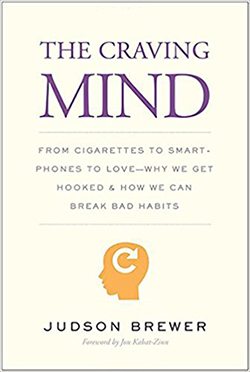Craving Freedom
Dr. Judson Brewer’s new book, The Craving Mind, explores the nature of addiction from both Western psychology and Buddhist perspectives
By Charlotte LiebermanI’ve always been miffed when I hear the casual confession, “I have such an addictive personality.”
In my understanding—and in my own experience—it seems there’s no way to be human without getting addicted to certain behaviors or habits of mind. When I go to my psychiatrist each week complaining about my latest compulsive behavior, she reassures me that addictions—of all kinds, from cigarettes to Facebook—are defenses, tactics we rely on to avoid discomfort. Can’t we all agree that we do this, in some form or another?
I’ve always assumed so.
In his new book, The Craving Mind, psychiatrist and neuroscientist Judson Brewer, MD PhD, addresses these issues with scientific rigor and comforting relatability. Brewer, who is the director of the Therapeutic Neuroscience Laboratory at the Center for Mindfulness in Medicine, Health Care, and Society at the University of Massachusetts Medical School, has spent the last 20 years studying the science of addiction, directing a clinical practice in addiction psychiatry, and devoting himself to his own meditation practice and study of traditional Buddhist teachings. Braiding together findings from both laboratory and clinical work, idiosyncratic patient stories, and refreshingly honest personal narrative, Brewer presents a simple—but not easy—claim “for all those who suffer”: we can use mindfulness to find freedom from our cravings—spanning everything from everyday self-destructive thoughts to drug addiction and beyond.
 The book is divided into two parts. Part One, “The Dopamine Hit,” probes the nature of addiction itself from both Western psychology and Buddhist perspectives. Brewer offers insights into specific addictions, showing how similarly the brain behaves in distinct situations of craving—whether your vice is refreshing Twitter mindlessly or reaching for the chocolate in a moment of loneliness or anger. While Brewer’s book is definitely not a how-to guide, I read Part Two, “Hitting Up Dopamine,” as the more solutions-oriented section of the book, as it offers actionable tools for concentration, compassion, and resilience while explaining—both anecdotally and scientifically—why it is that these practices are able to ameliorate the incessant cravings of the mind.
The book is divided into two parts. Part One, “The Dopamine Hit,” probes the nature of addiction itself from both Western psychology and Buddhist perspectives. Brewer offers insights into specific addictions, showing how similarly the brain behaves in distinct situations of craving—whether your vice is refreshing Twitter mindlessly or reaching for the chocolate in a moment of loneliness or anger. While Brewer’s book is definitely not a how-to guide, I read Part Two, “Hitting Up Dopamine,” as the more solutions-oriented section of the book, as it offers actionable tools for concentration, compassion, and resilience while explaining—both anecdotally and scientifically—why it is that these practices are able to ameliorate the incessant cravings of the mind.
Though Brewer’s book conceives of mindfulness practice from a traditional Buddhist vantage point, his concept of craving and addiction relies on the Western psychological framework of B. F. Skinner. At the outset of the book, Brewer provides an archetypal example of craving as a foundation for the rest of the book: “We see some food that looks good. Our brain says, Calories, survival! And we eat the food. We taste it, it tastes good…our bodies sent a signal to our brains: remember what you are eating and where you found it.” Of course, we not only remember where we got the food, but also the feeling of reward that we got when we ate it. And so, Brewer explains, “We learn to repeat the process the next time. See food. Eat food. Feel good. Repeat. Trigger, behavior, reward.”
Because our brains are so creative, this learning process does more than just remind us where food is. It also helps us try to make ourselves feel better when we are not feeling so good to begin with. And so we effectively teach ourselves to rely on food for that warm and fuzzy feeling when our emotions tell us to. Same learning process, different trigger. Instead of hunger telling us to eat, it’s sadness or anger. “It” can be anything, really.
As we all know, we’re good at tricking ourselves—so much so that we can even come to equate self-destruction with comfort. “Just like learning to eat chocolate when we are sad, habitually going to social media sites doesn’t fix the core problem that made us sad in the first place,” Brewer explains. “We have simply learned to associate chocolate or Facebook with feeling better.”
So how do you start to understand your own conditioning—your triggers, and your responses to them? And how is it that understanding and awareness will bring you freedom? These are the million-dollar questions, and Brewer thinks so too.
The answer to the first question is, once again, simple but not easy: we can understand ourselves and our minds more deeply by paying attention—deliberately, non-judgmentally. We can notice our reward-based habits, and interrogate them. By paying attention—and simply by trying to withhold judgment—we establish a greater sense of spaciousness around our habits and can see them more clearly. This is the essence of mindfulness. And what we’ll find with mindfulness, Brewer explains, is a “false identification” between “temporary ‘happiness’” (I’d probably call it misguided pleasure) and peace, contentment, joy. By establishing a mindfulness practice around addictive habits, we can see when the rewards aren’t working. We can notice, “Wow, I wanted that cigarette so badly, and instead, it made me nauseous and my breath disgusting.”
The next step is harder, of course. The Buddha and Skinner (and Brewer, among other experts he cites) agree on that. Part Two of the book gets more realistic, and granular, about the challenges of mindfulness practices: “Until we define happiness for ourselves…our habits will likely not change.” In other words, simply paying attention to our actions and thoughts—and the addictive habits therein—won’t get us anywhere if we don’t really want to change them. With his characteristically hospitable mode of sharing wisdom, Brewer compares mindfulness of cause-effect in our everyday lives to reading a good book: “If we want to read it, we begin reading, and assuming the book is good, we become interested in continuing to read…So too with mindfulness practice—we become more interested in investigating more and more what we are doing.”
This is much easier said than done. While I’ve only been practicing meditation and mindfulness for four years, I’ve been in therapy for 17, on antidepressants for 9, and I like to think I’m committed to personal growth. Yet even with all of these efforts, I continue to suffer from Obsessive Compulsive Disorder (OCD), which has plagued me since I was diagnosed at age 9. The truth is, I’m addicted to my OCD symptoms—most notably cleaning. They help me avoid anxiety, or at least that’s what I’ve convinced myself. Any time I am anxious, I clean. I have probably wasted months, if not years, of my life cleaning. I show up to meetings inadequately prepared because of cleaning; I flake out on friends because of crippling anxiety about the amount of dust I notice on the floor before leaving the house. And don’t get me started on litter. Sometimes, it’s tough to believe I’m able to live in New York City.
Mindfulness has made my OCD much better and, thanks to Brewer, I now understand a bit more why that is. By paying attention to the fluctuations of my anxiety and my corresponding behaviors, I am able to see with much more clarity, space, and wisdom that my defenses have not been helping me, nor will they ever. Today, I feel ready to grow beyond my cravings, and so by indulging them, I simply end up feeling frustrated. Realizing this is actually kind of fascinating, an opportunity for investigation.
That’s where the real work is—training ourselves to get curious. Brewer is aware that his proposed solution to addictive habits—investigating our own reward-based habits with curiosity—seems counterintuitive, if not impossible. “How can we become interested to the point of becoming fascinated and enraptured?” he asks. After all, most of us are tired of our own minds, and especially tired of our own self-destructive habits. Brewer gets that, but nonetheless answers with a case-study from his lab, explaining the measurably positive effects of curiosity on concentration as he proposes a way to retrain ourselves. “We can notice the trigger (stress), perform the behavior (become interested and curious), and reward ourselves in a way that is aligned with our stress compass (notice joy, tranquility, concentration, and equanimity.”
To an extent, there is a bit of the “fake it till you make it” adage underlying Brewer’s pedagogy. But strangely, it’s not faking it if you actually feel more authentic, whole, and aligned with the truth of your experiences. We’re culturally conditioned to believe that gritting our teeth gets us places in life, that a clenched fist is the marker of effort and potentially success. But what if all that gritting and clenching adds up to panic disorder and addiction? There’s a similar slew of counterintuitive questions to be asked about craving: why do we crave the things that make us feel bad? Why are we trained to believe that compassion for ourselves is selfish? Why is cultivating curiosity around our habits “faking it”? This book peels away our layers of conditioning around these questions.
Charlotte Lieberman is a Brooklyn-based writer and editor. You can read her prose in Cosmopolitan, Guernica, The Harvard Business Review, i-D, Marie Claire,BOMB, and Refinery29 and her poetry in The Boston Review, The Colorado Review, and Nat.Brut. Follow her @clieberwoman on Twitter, or at her blog www.fatfreebalsamic.com.
Image courtesy of unsplash.com
